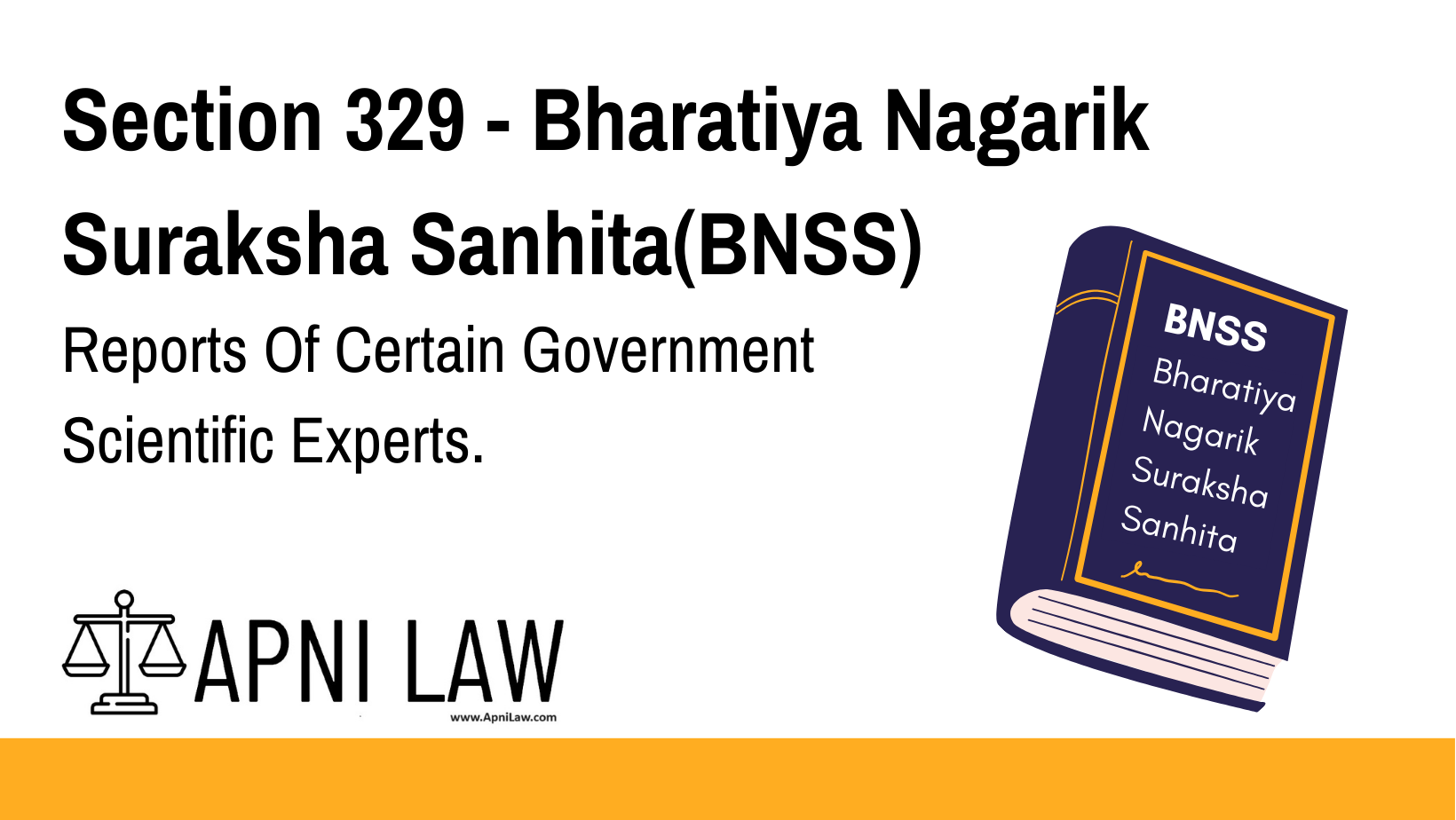Code: Section 329 BNSS
329. (1) Any document purporting to be a report under the hand of a Government scientific expert to whom this section applies, upon any matter or thing duly submitted to him for examination or analysis and report in the course of any proceeding under this Sanhita, may be used as evidence in any inquiry, trial or other proceeding under this Sanhita.
(2) The Court may, if it thinks fit, summon and examine any such expert as to the subject-matter of his report.
(3) Where any such expert is summoned by a Court, and he is unable to attend personally, he may, unless the Court has expressly directed him to appear personally, depute any responsible officer working with him to attend the Court, if such officer is conversant with the facts of the case and can satisfactorily depose in Court on his behalf.
(4) This section applies to the following Government scientific experts, namely:—
(a) any Chemical Examiner or Assistant Chemical Examiner to Government;
(b) the Chief Controller of Explosives;
(c) the Director of the Finger Print Bureau;
(d) the Director, Haffkeine Institute, Bombay;
(e) the Director, Deputy Director or Assistant Director of a Central Forensic Science Laboratory or a State Forensic Science Laboratory;
(f) the Serologist to the Government;
(g) any other scientific expert specified or certified, by notification, by the State Government or the Central Government for this purpose.
Explanation of Section 329 BNSS
Section 329 BNSS provides that reports prepared by designated Government scientific experts, when duly submitted for examination or analysis in any proceeding under this Sanhita, can be admitted as evidence. The key aspects of this section include:
- Admissibility of Expert Reports:
A report, signed by a Government scientific expert, is admissible as evidence in inquiries, trials, or other proceedings under this Sanhita. This facilitates the inclusion of technical and scientific findings in legal cases. - Summoning and Examination of Experts:
The Court retains the authority to summon and examine the expert regarding the subject matter of the report if it deems necessary. This ensures that the report can be scrutinized and clarified during the legal process. - Delegation in Case of Non-Attendance:
If the expert is unable to appear personally in court, and the Court does not insist on a personal appearance, the expert may designate a responsible officer who is well-versed in the details of the report to testify on his behalf. This flexibility helps prevent delays in proceedings. - Applicability to Specified Experts:
The section clearly enumerates the types of Government scientific experts whose reports are covered. This includes Chemical Examiners, the Chief Controller of Explosives, the Director of the Finger Print Bureau, and others from forensic laboratories and related institutions, as well as any other expert certified by the appropriate governmental authority.
Illustration
Example 1: Use of a Forensic Report in a Criminal Trial
In a criminal trial involving evidence from a crime scene, a report prepared by a Chemical Examiner is submitted as evidence. The report details the chemical analysis of substances found at the scene. The Court accepts the report under Section 329, and although the Chemical Examiner is not present, he deputes a knowledgeable officer from his laboratory to appear in court and clarify aspects of the report.
Example 2: Summoning of an Expert
In a case where the authenticity of a scientific report is critical to the outcome, the Court decides to summon the Government scientific expert who authored the report. During the examination, the expert is questioned on the methodology and conclusions of the report, thereby reinforcing the evidentiary value of the document in accordance with Section 329.
Common Questions and Answers on Section 329 BNSS
1. Can a report by a Government scientific expert be used as evidence in court?
- Answer:
Yes, under Section 329(1), a report prepared by a Government scientific expert, when duly submitted for examination or analysis, may be used as evidence in any inquiry, trial, or proceeding under this Sanhita.
2. What happens if the expert cannot appear in person?
- Answer:
If the expert is unable to attend personally, the Court may allow him to deputise a responsible officer, provided that the officer is conversant with the case facts and can testify satisfactorily on the expert’s behalf, as stated in Section 329(3).
3. Is the Court allowed to question the expert about his report?
- Answer:
Yes, Section 329(2) grants the Court the discretion to summon and examine the expert regarding the subject matter of his report, ensuring that the evidence is thoroughly vetted.
4. Which Government scientific experts are covered under Section 329?
- Answer:
The section applies to several specified experts, including Chemical Examiners, the Chief Controller of Explosives, the Director of the Finger Print Bureau, and directors or other designated officials of forensic science laboratories, among others as notified by the State or Central Government.
Conclusion
Section 329 BNSS facilitates the use of scientific evidence in legal proceedings by allowing reports from Government scientific experts to be admitted as evidence. It ensures that technical and forensic analyses can be effectively integrated into the judicial process, with provisions for expert examination and delegation in cases of non-attendance. This strengthens the overall evidentiary framework, supporting the fair and informed adjudication of cases. For more comprehensive legal insights and related provisions, visit ApniLaw.








